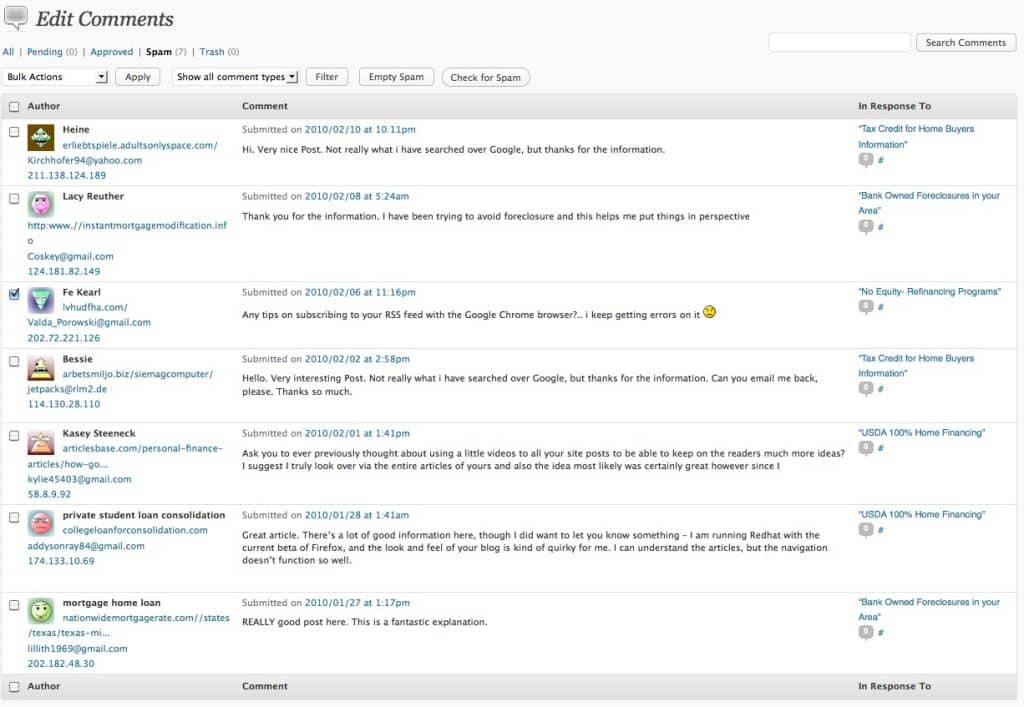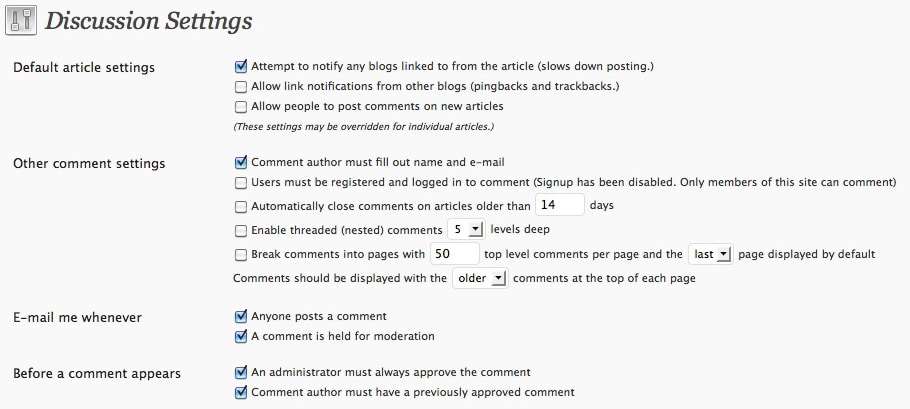Mortgage website spam. What is it? If you have a mortgage website or mortgage blog then chances are you are using a platform like WordPress (LeadPress uses WordPress), TypePad or similar. Spammers often target these and other mortgage blogging platforms that enable comments and pingbacks / trackbacks for the purpose of leaving bogus comments and pingbacks to gain links and exposure. Spammers’ leave spam comments in the belief that they will gain better search engine rankings and traffic by building as many links to their websites as possible. (LeadPress turns off commenting and pingbacks / trackbacks by default, but we also give you the ability to turn them back on for all new posts or on a post by post basis.)
Why Spammers Do What They Do
Spam is the abuse of electronic messaging systems and comes in many forms: email, comments and trackbacks / pingbacks (this is when an external website links to your article and your website automatically reciprocates the link in your comments section of the page the external site linked to). Spammers often employ bots or other automated systems to look for mortgage blog and website and leave self serving promotional comments / links.
Spam is a numbers game, so if spammers can send automated spam to large numbers of websites for very little money, so even if they convert a small percentage of the sites they spam, they can make a profit.
Spammers will also leave links to their websites in an attempt to push link juice or “Google Juice” to their websites, but most mortgage websites and blogs add a rel=”nofollow” tag to prevent the passing of pagerank or link juice. Links can be in the form of links in the body of the comment or simply a link where the user is supposed to put their website as most blogs allow you to post your name, email address and website before commenting so that your name as it is listed above your comment will link to the website you have provided.
BOTTOM LINE: Sending spam is a one way ticket to a complete loss of credibility and worse. If you come across a mortgage marketing company pitching automated commenting, run, don’t walk from that company.
What Does Mortgage Website Comment Spam Look Like and How Can It Affect Me?
Since leaving obvious spam comments that blatantly promote a product are easily detected and erase, spammers are continually improving their tactics to fool you into thinking their comments are legitimate. They often leave compliments about your web site or mortgage blog, tell you that there is something broken on your mortgage web site or ask questions that are irrelevant to the page content.

What Can I Do About Mortgage Website Spam?
Leaving comment spam on your mortgage web site can be detrimental to your site and overall credibility. It’s like leaving trash around your office, if you don’t clean it up, it shows you don’t care.
Most blogging platforms enable you to delete spam and even set filters so that new comments must be approved before going live. Since LeadPress is based in WordPress, you have extensive control over allowing and filtering comments and trackbacks on a sitewide or per post basis.

Mortgage Blog Commenting Best Practices and Etiquette
Since mortgage spammers often leave spam comments in the form of complimentary or other similarly disguised comments, how can you make sure your comments on other mortgage blogs and websites isn’t mistaken for comment spam?
- Do not blatantly self promote. You are a guest when posting in the comment stream of a blog that you do not own, so treat the opportunity as a chance to share and learn. If you hijack a comment stream with your own self promotion, expect to be deleted and have your credibility questioned. What do you think about people that spam your mortgage blog? Exactly, don’t be that guy.
- Add to the conversation. Say something useful that truly contributes. This is so important. You may be well intentioned by leaving a comment like “Nice blog”, but you aren’t contributing anything to the conversation and will likely be considered comment spam. Put thought into your comment and hold back unless you are truly contributing to the conversation.
- Do not add your signature or links in your comment. Again, you are a guest, act like one.
- Do not put keyword rich text as your name when commenting. As a guest, it’s nice to comment as “John Doe”, commenting as “Florida Home Modification Loans”, not so nice and again is a one way ticket to being marked as spam.


About The Author: Trace
My name is Trace and I’m the founder of LeadPress and an entrepreneur specializing in web development and lead generation. In another life I was a California Real Estate Broker and an Equities Trader holding the Series 7, 63, 55 and 24 Securities Licenses.
More posts by Trace